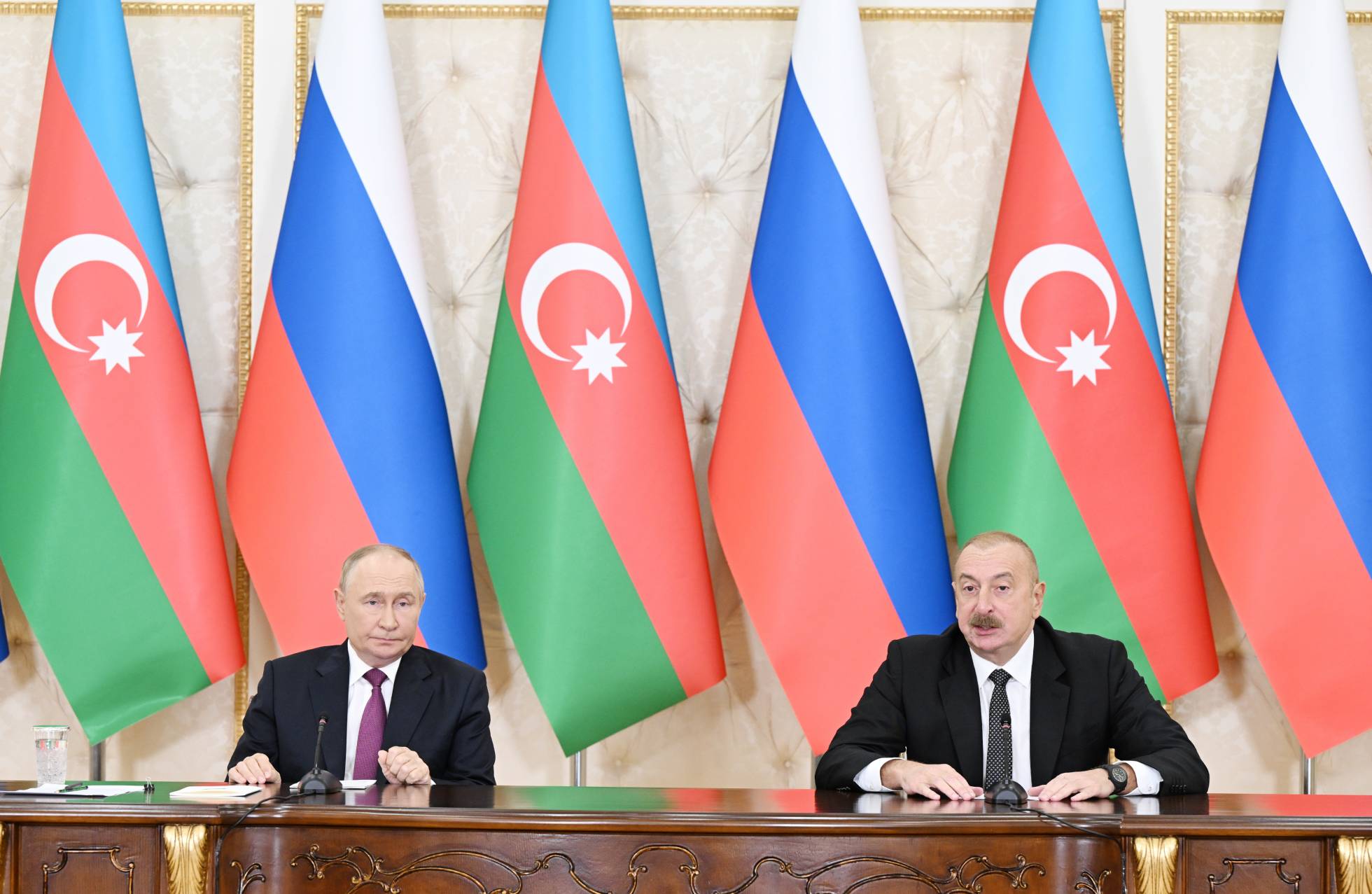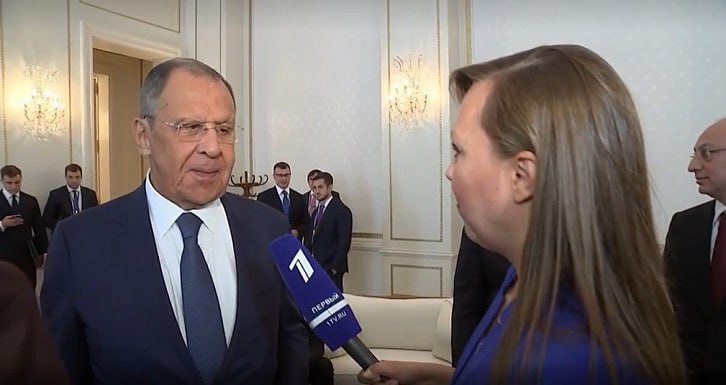
YEREVAN—Russian President Vladimir Putin has concluded a two day visit to Baku, where Putin reasserted Russia’s role in facilitating the resolution of Armenian-Azerbaijani relations.
Speaking at a press conference on August 19, Putin emphasized Russia’s readiness to assist in the demarcation of the Armenian-Azerbaijani border, the unblocking of transport routes and the enhancement of humanitarian contacts. Putin highlighted that a strong and stable peace in the South Caucasus aligns with the interests of all countries and peoples in the region.
During the visit, Russia and Azerbaijan signed three agreements and three memorandums, further solidifying their bilateral relations. Putin expressed satisfaction with the agreements and extended an invitation to Azerbaijani President Ilham Aliyev to attend the CIS Heads of State Council session in Moscow this October and participate in the outreach format meeting at the BRICS summit in Kazan.
Following Putin’s visit, Azerbaijan has officially submitted an application to join BRICS, according to a statement by Aykhan Hajizade, the press secretary of Azerbaijan’s Foreign Ministry. This move follows the adoption of the “Joint Declaration on the Establishment of Strategic Partnership between the Republic of Azerbaijan and the People’s Republic of China” on July 3 during the Shanghai Cooperation Organization summit in Astana.
According to analyst Karen Bekaryan, the timing and location of the visit were carefully chosen to serve multiple purposes. Bekaryan argued that Putin’s visit was intended to demonstrate that despite the ongoing crisis in Kursk and the volatile situation in Ukraine, Russia remains capable of projecting power and influence beyond its borders. “The visit underscores that the Russian-Ukrainian conflict does not impede Russia’s efforts to strengthen its position in the South Caucasus,” Bekaryan said.
Bekaryan suggested that the visit signals a broader strategy to reinforce Russia’s regional influence. “The timing and substance of the visit indicate a multi-faceted approach rather than a singular objective,” he said.
Bekaryan criticized the Armenian government for diminishing the country’s strategic importance. He argued that the government’s shifting foreign policy orientation away from Russia has reduced Armenia’s influence and relevance on the regional stage. “The real issue is not merely a change in foreign policy direction, but rather the reduction of Armenia’s strategic significance under the current administration,” Bekaryan said. He emphasized the need for foreign powers and neighbors to recognize Armenia’s historical strategic importance, irrespective of who is in leadership.
Russian Foreign Minister Sergey Lavrov, who was also in Baku, accused Yerevan of “sabotaging” previous agreements aimed at reopening transportation routes in Armenia’s Syunik province. The Armenian Foreign Ministry has strongly criticized Lavrov’s comments as “false” and “regrettable,” casting doubts on Russia’s constructive engagement in facilitating the normalization of relations between Armenia and Azerbaijan.
In an August 20 message, the Armenian Foreign Ministry emphasized that the Armenian government’s “Crossroads of Peace” initiative, designed to reopen regional connections, is ready for implementation at any time. It urged Moscow to avoid making such “biased statements.”
During an interview with Russia’s Channel One on August 19, Lavrov advocated for the swift conclusion of a peace treaty and the unblocking of regional communications. He attributed delays to what he called the Armenian leadership’s sabotage of the November 9, 2020 trilateral ceasefire agreement signed by PM Nikol Pashinyan, expressing confusion over Yerevan’s position. Lavrov underscored the importance of adhering to the spirit and terms of agreements reached in 2020-2022 by the leaders of Russia, Azerbaijan and Armenia, which address various aspects of the conflict and outline steps toward its resolution.

Lavrov’s statements have intensified scrutiny over the fulfillment of these commitments, particularly the security and transport arrangements concerning the “Zangezur corridor,” which remains a contentious issue. Earlier this month Elchin Amirbekov, Azerbaijan’s special envoy, announced that the regional communication duties article was removed from the peace treaty draft to avoid complicating negotiations with Armenia.
These comments have sparked renewed debate over the implementation of the November 9, 2020, trilateral ceasefire agreement, which in part called for the unblocking of economic and transport links in the region. Some opposition figures have criticized the Armenian government for not declaring the statement void, which would require revisiting the status of territories including Karvachar, Kashatagh and Akna surrendered in 2020.
Meanwhile, as Azerbaijan prepares to host the upcoming U.N. Climate Change Conference (COP29) conference, Armenian and Artsakh politicians have called on the global community to reconsider its participation.
In a strongly worded statement, Ishkhan Saghatelyan, a member of Armenia’s National Assembly and representative of the Armenian Revolutionary Federation, called for a complete boycott of the conference in Baku. In a Facebook post on August 20, Saghatelyan warned that Armenia’s participation in COP29 would legitimize what he described as an “Azerbaijani show,” designed to distract the international community from serious allegations of war crimes and ethnic cleansing of Armenians in Artsakh.
Saghatelyan argued that the event would be used to bolster Azerbaijan’s international reputation and mask its ongoing human rights abuses. The conference, scheduled to take place in November, will attract thousands of international delegates, including political leaders, human rights activists, environmental organizations and media representatives.
“Armenia’s absence is crucial to preventing the Azerbaijani government from furthering its narrative of regional peace while disregarding the atrocities committed against the Armenian people,” Saghatelyan said.
The call for a boycott comes amid increasing international pressure on Azerbaijan. Saghatelyan urged the European Union to demand the immediate release of the political and military leaders of Artsakh currently detained in Baku. He called for the withdrawal of Azerbaijani forces from what he described as occupied territories within Armenia’s sovereign borders.
Adding to the controversy surrounding COP29, EU Observer Editor-in-Chief Elena Sànchez Nicolàs has raised concerns about Azerbaijan hosting the event, given its reliance on fossil fuels and history of human rights abuses. In an op-ed published on August 19, she noted the irony in Azerbaijan branding COP29 as a “COP for Peace” while continuing to engage in aggressive actions against Armenia. Sànchez Nicolàs highlighted the growing calls from activists and human rights defenders for reforms in how host countries for such events are selected, urging that they adhere to climate and human rights standards.
As the conference approaches, former U.N. Global Compact vice-chair Paul Polman and other international figures have highlighted that Armenia-Azerbaijan peace is being negotiated under coercive conditions. They argue that Armenia cannot engage in peace talks while its representatives are imprisoned, undermining the potential for genuine dialogue.
The National Assembly of Artsakh has also voiced strong objections to Azerbaijan’s hosting of COP29. In a joint statement released on August 21, the National Assembly highlighted Azerbaijan’s efforts to mislead the international community and divert attention from its ongoing human rights abuses. It condemned Azerbaijan’s actions in Artsakh and its attempts to alter the region’s cultural heritage, calling on the international community to expose Azerbaijan’s intentions and reconsider participating in the conference.
Author information
The post Putin discusses Armenia-Azerbaijan negotiations during visit to Baku appeared first on The Armenian Weekly.